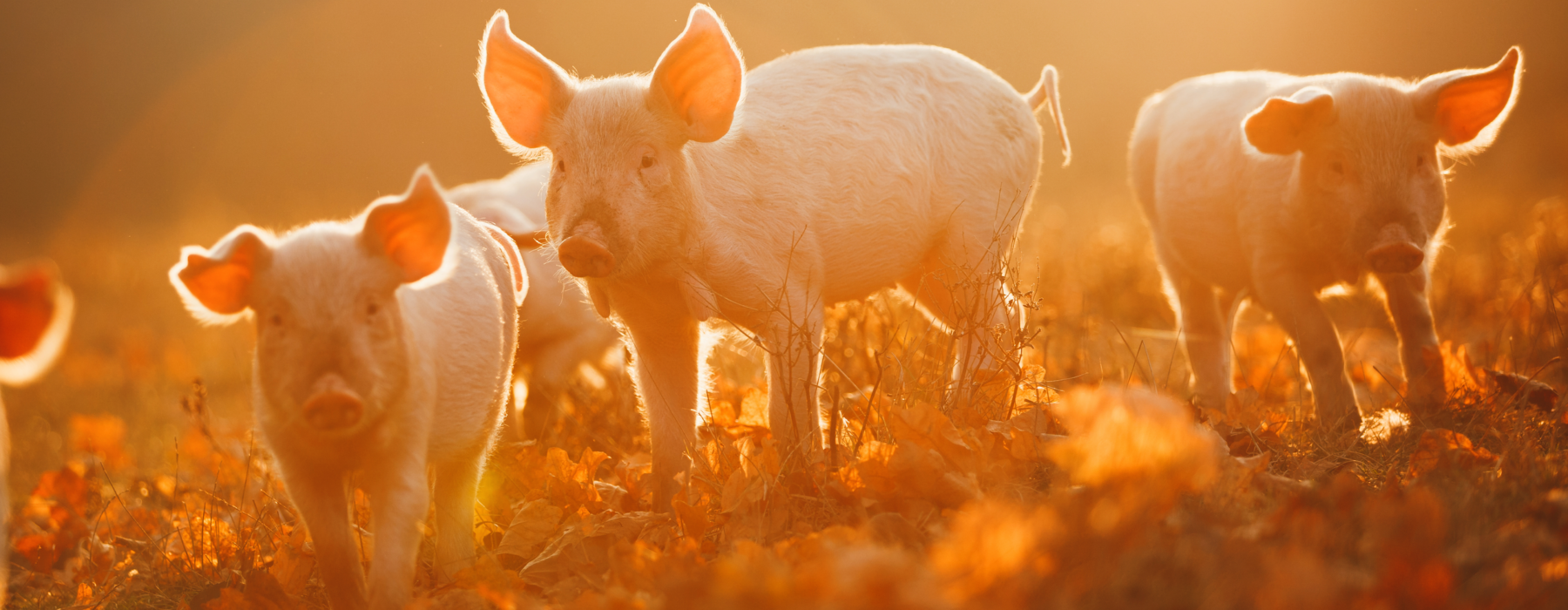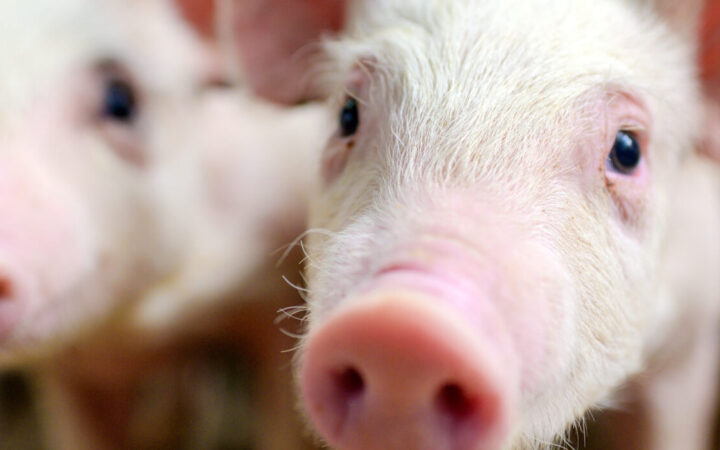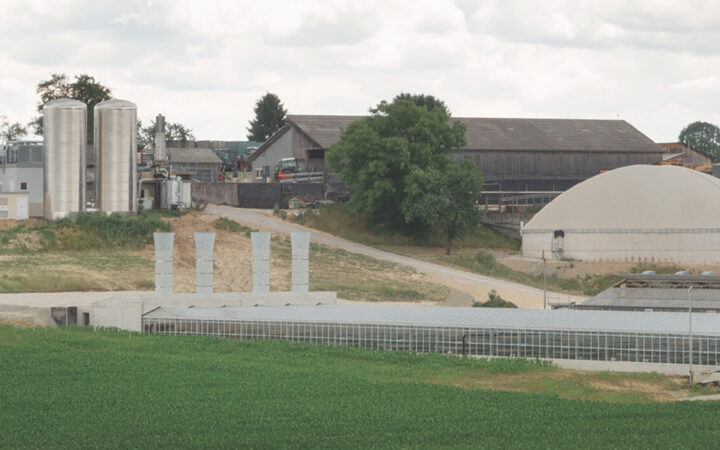This guide helps farmers and food producers understand what welfare-certified farming can look like—ultimately giving them the tools to sustain humane practices and greater transparency.
How to Use This Guide
Understand what certification means. First, read about what it means to participate in the covered certification programs.
Review programs. Second, review and compare program standards, certification processes and costs.
Explore case studies. Explore further and read first-hand farmer certification experiences.
Learn more. Finally, learn about transition financing, labeling guidelines and additional resources.
Welfare Certifications
What are farm animal welfare certification programs?
Independent, non-governmental organizations. Animal welfare certification programs are not affiliated with government entities. They are independent, non-profit organizations (NPOs) or programs of NPOs.
Standard-setters. These programs develop animal welfare standards covering various aspects of farm animal husbandry, including breeding, birth, food and water, health management, housing, pasture access, transport, slaughter and record-keeping. These standards are publicly available online.
Certifying and labeling programs. Farm/ranch businesses that are found to meet a program’s standards may apply for program certification. Once certified, it may use the program’s label (and animal welfare claims) on certified animal products. According to the programs, results of audits and other business information are treated as confidential.
Beneficial to Business. These programs can benefit farm animals and businesses through market access, product distinction, brand lift and as a foundation for a good animal management plan. For more on potential business benefits of welfare certification, see the next page.
Why Animal Welfare Approved, Certified Humane® and Global Animal Partnership?
Transparency. Standards and certification processes are publicly available and clear. Rigor. Animal welfare standards are meaningfully better than conventional, with enriched, cage- free environments as a baseline.* According to each program, 100% of the standards are required to pass an audit, systems are in place to address non-compliance and standards are routinely reviewed to reflect best practices.
Independent audits. Generally, require regular, on-site audits to confirm compliance with certification standards.
National presence. Each program certifies farm and ranch businesses nationally. The standards are applicable to all climates in the United States (not regional), marketed and recognized across the country.
Why Certify: The Triple Win
Compliance with farm animal welfare certification is a win-win-win for farm animals, farm/ranch businesses and consumers.
Farm animals win. Improved animal welfare means higher quality of life, increased ability to perform natural behaviors and more humane methods of slaughter.
Farmers/Ranchers win. In addition to providing a strong, welfare-focused management structure, welfare certification can offer access to new markets, a marketing edge against competitors and enhanced credibility with consumers.
Consumers win. Welfare certification programs allow consumers to easily identify products that are certified to meet more humane standards.
Why Certify: The Business Benefit
Consumers are increasingly interested in, and willing to pay more for, animal products from farms using more humane animal husbandry practices. Accordingly, retailers, distributors, institutions, food service companies and restaurants are increasingly seeking to buy welfare-certified animal products. Meanwhile, major media outlets and consumer organizations are addressing farm animal welfare and helping consumers navigate food labels. These trends present farmers and ranchers with the opportunity to independently verify improved welfare for farm animals and tap into the fast-growing market for animal welfare-certified products.
Consumers care
Consumers nationwide are increasingly interested in purchasing animal products that are certified as reflecting more humane animal husbandry practices. A 2018 survey found that 76% of consumers are concerned about the welfare of animals raised for food, with high levels of concern found across demographic groups (2018 Lake Research Partners survey). Concern remained high regardless of factors such as gender, race, age, education, household income, or political affiliation. Consumers who frequently purchase meat products are more concerned about animal welfare (83%) than those who purchase meat products less frequently (69%). Almost three-quarters of consumers (71%) report paying attention to food labels regarding how the animal was raised (2018 Lake Research Partners survey). 62% of consumers place a high degree of trust in certification by an independent animal welfare organization. Far fewer indicate trust in government, industry associations or self-reported business records (Animal Welfare Institute citing 2012 Just Bare Chicken survey).
Premium Pricing
Consumers are willing to pay a premium for welfare-certified products that they know have been independently verified to a set of higher animal welfare standards. A large majority (81%) of the consumers in a 2018 survey who indicated that they would like more higher welfare options where they shop maintained that desire even if that meant a moderate increase in price (2018 Lake Research Partners survey). A 2015 survey found that millennial consumers are the most willing (73%) to pay more for sustainable or socially responsible products, and represent a fastgrowing segment of the market (2015 Nielsen survey).
Committed Purchasers
In response to consumer demand, a growing number of companies, retailers, food service companies, and institutions are committing to buying and selling welfare-certified animal products. Of particular note is the growing number of institutional purchasers who have committed to food sourcing policies that include humane sourcing requirements based on third-party animal welfare certifications. Through policies like the Good Food Purchasing Program, the Real Food Challenge, the Leadership Circle, and Healthcare Without Harm’s Healthier Hospitals initiative, public institutions ranging from individual hospitals and universities to entire counties and cities are committing to more sustainable, humane sourcing. All four of these responsible sourcing programs rely on third-party animal welfare certifications to ensure that humane sourcing requirements are met. There are currently over 550 hospitals across the country participating in the Healthier Hospitals program – too many to list in this guide.
Good Food Purchasing Program Adopters (as of September 2019)
- Austin Independent School District
- Chicago Parks District
- Chicago Public Schools
- Cincinnati Public Schools
- Cook County, Illinois
- City of Boston
- City of Los Angeles
- Los Angeles Unified School District
- Oakland Unified School District
- San Francisco Unified School District
- Washington, D.C. Public Schools
- Antioch College
- Bard College
- California State University system
- Case Western Reserve University
- Clark University
- College of the Atlantic
- Cornell College
- Colorado Mountain College system
- Drew University
- The Evergreen State College
- Florida Gulf Coast University
- Fort Lewis College
- George Washington University
- Gonzaga University
- Haverford College
- The Hotchkiss School
- Johns Hopkins University
- Lehigh University
- Lyndon State College
- Macalester College
- Marlboro College
- McDaniel College
- Middlebury College
- Northwestern University
- Oberlin College
- Occidental College
- Saint Mary’s College Notre Dame, IN
- Siena College
- Smith College
- Sterling College
- Stonehill College
- University of California system
- University of Denver University of Maine system
- University of Massachusetts, Amherst
- University of Montana
- University of North Carolina, Chapel Hill
- University of Oklahoma
- University of Pittsburgh
- University of Utah
- University of Vermont
- Warren Wilson College
- Wesleyan University
- Western State Colorado University
- Western Washington University
Leadership Circle Members (as of September 2019)
- Airbnb
- Bon Appétit
- Case Western Reserve University
- The Colburn School
- Dr. Bronner’s
- Harvard Business School
- Hazon
- The Institute of American Indian Arts
- The Northwest School
- Phipps Conservatory and Botanical Gardens
- The Thacher School
- University of California Berkeley
- Vassar College
- Villanova University Dining Services
- Washington University in St. Louis
- Willamette University
Trending Issue
As more individuals, institutions and companies examine where their food comes from and demand more of producers, third-party certification programs play a key role in ensuring transparency and enforcement of rigorous standards. Consumers are wary of empty, misleading marketing claims like “natural” and “free range” and are looking to source from producers that can verify their farming practices with meaningful animal welfare certifications. In addition to the ASPCA, major media and consumer organizations are educating consumers about the value of welfare-certified foods and helping them navigate humane labeling claims. The topic has been addressed in well-known publications including: The New York Times, The Wall Street Journal, NPR (National Public Radio), Chicago Tribune, National Geographic, Consumer Reports and Market Watch. Animal Welfare Approved, Certified Humane, and GAP have consistently been recognized as standouts in the marketplace, with meaningful animal welfare standards and rigorous auditing schemes. Organizations that have recognized the three certifications include the ASPCA, Consumers Union/Consumer Reports, the US Healthful Food Council, Food Animal Concerns Trust, Farm Forward, the Center for Food Safety, School Food Focus, Compassion in World Farming and the Rodale Institute. The ASPCA’s consumer education campaign, Shop With Your Heart, directs consumers to the three welfare certifications, using a label guide to educate shoppers about the differences between welfare certifications and unverified claims. The ASPCA also helps connect consumers to higher welfare food by publishing a list of welfare-certified brands and a state-by-state directory of welfare-certified farms.
Acknowledgements
The ASPCA and CAFS thank the following individuals for their efforts in producing the Farm Animal Welfare Certification Guide and 2019 update: ASPCA staff, including Daisy Freund (Senior Director, Farm Animal Welfare); Kara Shannon (Senior Manager, Farm Animal Welfare); Suzanne McMillan (Content Director, Farm Animal Welfare); Nancy Roulston (Director of Corporate Engagement, Farm Animal Welfare); Meredith Geoghegan and Carrie Straus (Member Communications); and Vermont Law School’s Center for Agriculture and Food Systems, including Laurie Beyranevand (Director), Claire Child (Program Manager), Pamela Vesilind (Adjunct Faculty), Laurie Ristino; Jamie Renner, Ellen Griswold (LLM), and Mackenzie Landa (LLM).
We also thank the following individuals for providing consultation in support of case studies and the Guide, generally: Gabe Clark (Coldspring Ranch), David Pitman (Mary’s Chicken), Beth Hodges (Echo Farm Puddings), Georgia Ranney (Kinderhook Farm), Jesse Laflamme (Pete and Gerry’s Organic Eggs), Angela Miller (Consider Bardwell Farm), Jacqueline Smith (Central Grazing Co.), Nadine Rich (Teton Waters Ranch), Charles Thieriot and Don Sinnott (Rancho Llano Seco); Andrew Gunther (Animal Welfare Approved), Emily Lancaster Moose (Animal Welfare Approved), Adele Douglass (Certified Humane), Mimi Stein (Certified Humane), and Anne Malleau (Global Animal Partnership).
Suggested Citation
ASPCA, Farms Animal Welfare Certification Guide (2019), https://www.aspca.org/sites/default/files/fw_cert_guide_updt_2019_web_05.pdf.



